What is a Fraud? A fraud is when one party deceives or takes unfair advantage of
another. A fraud includes any act, omission, or concealment, involving a breach of legal or
equitable duty or trust, which results in disadvantage or injury to another. In a court of law
it is necessary to prove that a false representation was made as a statement of fact, that was
made with the intent to deceive and to induce the other party to act upon it. It must be
proven that the person who has been defrauded suffered a injury or damage from the act.
Who commits a fraud and why? It is generally accepted that 20 percent of
employees are honest. Another 20 percent are dishonest and don't mind doing wrong. That
means the remaining 60 percent are potentially dishonest, that's a total of 80 percent of
employees which may be dishonest.
To understand fraud you first have to determine the
contributing factors to why people commit fraud. Some people commit fraud for the sport
and thrill of it. There are other recognizable reasons why honest people may commit a
breach of trust. Need is the most common reason. A desperate financial need is usually the
cause of most frauds. Still some people commit fraud to pay for an elevated life style
which other wise they could not afford. Needs arise from a number of locations these
include: Drug or alcohol addiction, Marriage break-ups and/of extravagant love affairs,
Gambling Debts, Business losses, Unexpected family crises, Mounting debts, and the
desire to live a lifestyle far beyond ones means.
Fraud is costing society several hundred billion a year. Organizations loose close
to 6 percent of annual revenue to fraud and abuse of social systems. Fraud costs Canadian
organizations $100 billion annually. On the...


